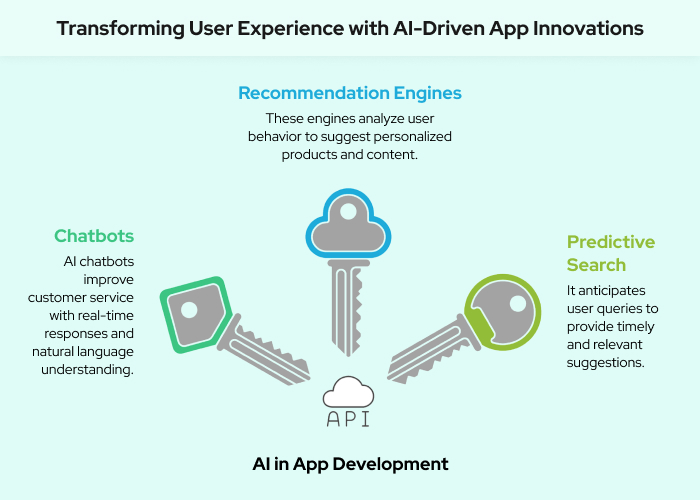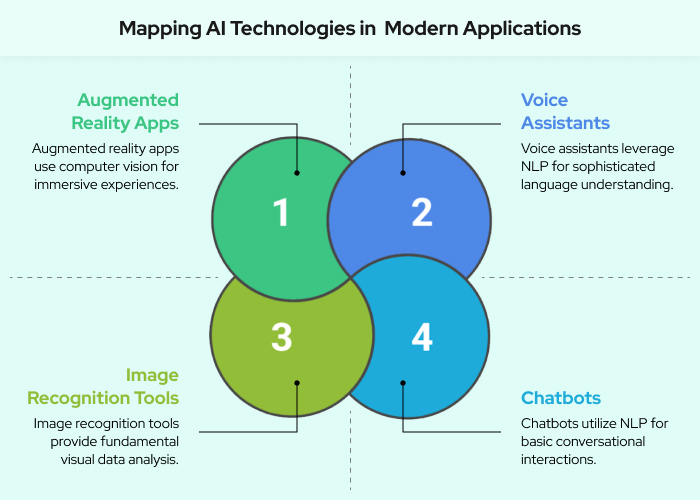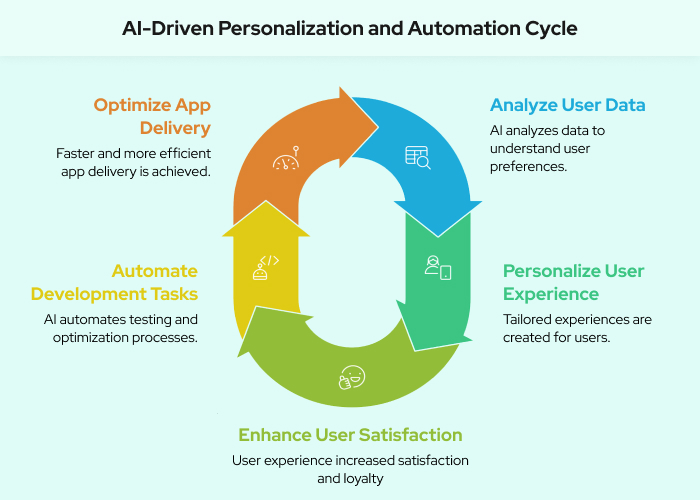AI-Powered Chatbots, Recommendation Engines, and Predictive Search

Recommendation engines are another critical application of AI in app development. By analyzing user behavior and preferences, these engines can suggest products, services, or content tailored to individual users, significantly improving user satisfaction and retention. For instance, e-commerce platforms like Amazon and streaming services like Netflix leverage recommendation algorithms to enhance user experience and drive sales.
Predictive search is yet another area where AI is making a substantial impact. By anticipating user queries based on historical data and trends, apps can provide relevant suggestions even before the user finishes typing. This not only speeds up the search process but also improves the overall user experience.
How Computer Vision and NLP Are Shaping Modern Apps

On the other hand, NLP allows apps to process and analyze human language. This capability is crucial for applications that rely on text input, such as messaging apps, content creation tools, and voice assistants. By understanding context and sentiment, NLP can enhance user interactions, making them more natural and efficient.
AI for Personalized User Experiences and Automation

Moreover, AI facilitates automation in app development processes. From automating testing and debugging to optimizing performance, AI tools can significantly reduce development time and costs. This allows developers to focus on more complex tasks, ultimately leading to faster and more efficient app delivery.
Case Studies of AI-Driven App Development Success Stories
Several companies have successfully harnessed AI and ML to enhance their app offerings. For instance, Spotify uses machine learning algorithms to analyze user listening habits and curate personalized playlists, resulting in a highly engaging user experience. Similarly, Duolingo employs AI to adapt language lessons based on user performance, ensuring that learners receive content that matches their skill level.
Another notable example is AlianHub, a cutting-edge ERP platform that revolutionized project and product management by integrating AI-driven automation and analytics. By leveraging AI, AlianHub enhances operational efficiency through real-time project tracking, intelligent status reporting, and predictive insights. The system automatically generates detailed project reports, eliminating the need for manual updates. AI-powered status reports provide actionable insights by analyzing progress, resource utilization, and potential bottlenecks. Additionally, automated task creation ensures that work assignments are optimized based on workload distribution and project deadlines. This AI-driven approach has empowered businesses to streamline workflows, improve decision-making, and accelerate project delivery, making AlianHub a game-changer in the ERP landscape.
Conclusion
The integration of AI and ML into web and mobile app development is revolutionizing the industry, creating smarter, more efficient, and user-friendly applications. From AI-powered chatbots and recommendation engines to the transformative capabilities of computer vision and NLP, these technologies are reshaping how users interact with apps. As we continue to explore the potential of AI, the future of app development looks promising, with endless possibilities for innovation and improvement.
Ravi Bhojani is the Chief Marketing Officer (CMO) at Alian Software, where he spearheads the company’s marketing strategies and drives its brand presence in the competitive IT services landscape. With over a decade of experience in the technology and marketing sectors, Ravi has consistently demonstrated his ability to blend innovative marketing techniques with deep industry knowledge to deliver outstanding results.